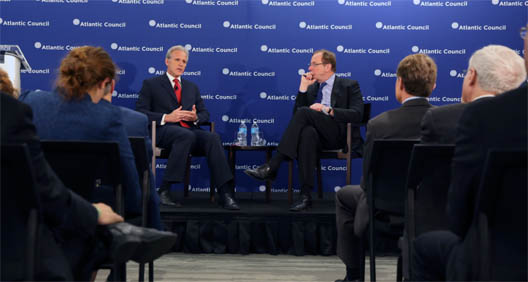 A 35-Year Pax Americana is waning, says former Israeli Ambassador Michael Oren
A 35-Year Pax Americana is waning, says former Israeli Ambassador Michael Oren
The recent years’ decline of US power and assertiveness in the Middle East has created a power vacuum there that may end 35 years of American pre-eminence in the region, said Michael Oren, Israeli historian and former ambassador to the United States. “While it is surely premature” to proclaim the end of that American era, domestic political attitudes have pulled the US government back from its dominance in the years since it brokered the first Arab-Israeli peace deal in 1978, Oren said in a discussion at the Atlantic Council.
“There’s a sense [among Americans] … that America could go home from the Middle East, turn its back on the Middle East,” said Oren, “and that belief may prove illusory.”
“The big litmus” in measuring whether US dominance in the Middle East has ended will follow the coming six months of negotiations meant to prevent Iran from obtaining nuclear weapons, said Oren. Will those negotiations “recognize a certain hegemonic role for Iran in the region?” Oren asked. If the talks produce an agreement, “Israel and the [Arab] Gulf countries are going to have to ask themselves, is this something we can live with? … It’s going to be a very tough decision.”
Oren spoke in his first appearance as ambassador-in-residence at the Atlantic Council’s Brent Scowcroft Center on International Security. An academic historian by training, Oren sketched a broad mural of the historical US role in the Middle East, noting that it was a threat to shipping from North African pirates that helped force the young American nation to create a navy – and thus to write a constitution for a federal government strong enough to accomplish that task.
The US domination of the region in recent decades began with the Carter administration’s brokering of the first Arab-Israeli peace deal in 1979, Oren said. He described it as a Pax Americana [that] was always heavy on Americana and light on Pax.” The decline of US power has been visible in the US withdrawal from its occupation of Iraq, its ceding of leadership in the overthrow of Muammar al-Qaddafi in Libya, its “zig-zagging” in policy on Egypt, and ineffectiveness in Syria, Oren said.
“Like in nature, geopolitics abhors a vacuum,” and “the power vacuum left in America’s wake” has drawn other countries into more assertive roles, Oren said. Russian and Chinese delegations are touring the region, seeking new influence for their governments, and ”the French have stepped up to what they see as a vacant home plate in the Middle East.”
Public “impressions in the Middle East are absolutely cardinal,” Oren said, and the current impression is that “the age of American pre-eminence is over. The house … is tottering.”
That impression may not reflect reality, Oren said, noting that American military power and diplomacy still dominate those of others. Citing US naval forces as an example, he said, “America’s technology remains regnant in the Middle East.”
The point, Oren said, is that uncertain US politics and policymaking have opened the question of American permanence in a way it has not been for more than three decades.
The Scowcroft Center last month named Oren as its first ambassador-in-residence. “At a crucial moment in the history of the Middle East, he deepens the Atlantic Council’s work and expertise on peace and security issues” centered in the region, said Frederick Kempe, president and CEO of the Atlantic Council, who introduced Oren at the February 10 event.
Oren served from mid-2009 until September as Israel’s ambassador to the United States. He previously pursued an academic career, serving as a visiting professor at Harvard, Yale and Georgetown universities. His most recent books, Power, Faith, and Fantasy: America in the Middle East from 1776 to the Present and Six Days of War, were New York Times bestsellers.
